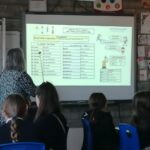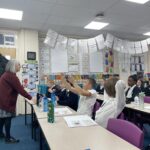Modern Foreign Languages
We provide an opportunity for our children to develop their modern foreign language skills, to prepare them for secondary school or experiences later in life. We believe in forming a concrete foundation of basic language skills, which children will be able to build upon in the future. We provide our children with the chance to become bilingual, which may be essential to them when they are older. School Improvement Liverpool provide fun and engaging lessons, which inspire children and develop their confidence, which our teachers reinforce throughout the week. KS2 are provided with weekly Spanish lessons on a Thursday.
Spanish Curriculum intent
School Improvement Liverpool Primary MFL Policy Rationale Learning a language enriches the curriculum. It provides excitement, enjoyment and challenge for children and teachers, helping to create enthusiastic learners and to develop positive attitudes to language learning throughout life. The natural links between languages and other areas of the curriculum can enhance the overall teaching and learning experience. The skills, knowledge and understanding gained make a major contribution to the development of children’s oracy and literacy and to their understanding of their own culture/s and those of others. Language also lies at the heart of ideas about individual identity and community, and learning another language can do a great deal to shape children’s ideas in this critical area as well as giving them a new perspective on their own language. In particular, language learning:
- stimulates children’s creativity
- leads to gains across the curriculum
- supports oracy and literacy
- supports and celebrates the international dimension
- Liberates children from insularity and fosters pupil’s curiosity and deepens their understanding of the world.
Aims
- To capitalise on the ability of young pupils to rapidly acquire passive and active knowledge of another language
- Where possible and relevant, to embed the language into the main primary curriculum
- To broaden the cultural awareness of the pupils and to foster positive attitudes to language learning, speakers of other languages and other cultures
- To create confident language learners who enjoy languages, who can express their thoughts and ideas in another language and can understand and respond to its speakers both in speech and writing.
- To use the target language in the lessons as much as possible
- For the school to be able to deliver the curriculum for primary languages using either specialist teachers on the staff or FLAs from School Improvement Liverpool, with the support of the MFL team.
Spanish Curriculum implementation
The learning of a foreign language should be enjoyable and relevant for all pupils and a variety of approaches and activities should be used to challenge, motivate and sustain interest. Lessons will be interactive and will provide an appropriate balance of spoken and written language and should lay the foundations for further foreign language teaching at Key Stage 3. The focus will be on practical communication. Lessons should enable pupils to understand and communicate ideas, facts and feelings in speech and writing. Approaches and activities include:
- Almost exclusive use of the foreign language during lessons
- Providing opportunities in each lesson for pupils to use and practise what they have learned
- Language games to enhance motivation, contextualise learning and heighten enjoyment
- Learning songs and rhymes and stories
- Focus on grammatical structures and phonology.
- Pair-work and group work
- Use of authentic materials
- Use of ICT where relevant and appropriate – for example commercially produced software, teacher produced resources, internet research and use of the interactive whiteboard
- Written activities to reinforce learning
- Correspondence with partner schools focusing on cultural differences and similarities Detailed methodological suggestions are provided in the scheme of work.
Inclusion
All pupils are equally valued, including those who need extra support for a range of educational needs and more able pupils. To ensure that all pupils recognise and fulfil their potential the following strategies for differentiation are employed:
- use of visual aids / gesture
- choral and individual repetition
- physical responses to questions
- open and closed questions
- multiple choice questions
- tasks with small, clearly identified steps
- practical activities
- higher achievers encouraged to lead specific language tasks
- use of FLA, classroom assistant or class-teacher to support some learners
- appropriate pupil groupings
- differentiated written work
Learning a language in the primary phase should be a positive experience for all pupils. Differentiation is essential if all pupils are to regularly experience success. Every opportunity is taken to enable pupils to progress according to their abilities.
The Role of the FLA
- At the beginning of each academic year the FLA attends an intensive training course about primary language methodology. They are also expected to attend an additional training day each term throughout the year. They should be released from teaching duties in order to attend this training.
- The FLA will plan their lessons based on the Liverpool Schemes of work and will provide resources for the lesson. They will provide the class teacher and coordinator with half-termly planning at the beginning of each half term and where appropriate will leave work/resources for the class-teacher to follow on their lesson.
- They may do a twice yearly assessment form with the pupils, which can be completed in class time and kept on file by the class-teacher.
- When pupils are ready the FLA will provide written work at an appropriate level. This should largely be marked in class by the FLA with the help of the teacher. The FLA should be informed of the marking policy in school in order to comply with the school’s requirements.
- FLAs can provide a bank of report comments which can be used by class teachers for annual reports
The Role of the MFL Subject Leader
- ▪ Liaise with the FLA, class teachers and School Improvement MFL team to timetable and co-ordinate MFL lessons.
- ▪ Ensure that a member of staff is always present in MFL lessons and is encouraged to take part. Our staff love our Spanish lessons and have as much fun as the children!
- ▪ Where possible, to support staff in delivering MFL by providing resources and informing them of any training opportunities.
- ▪ Attend any central training and meetings as appropriate and disseminate information back to staff.
- ▪ Monitoring of MFL lessons.
- ▪ Co-ordinate festivals/celebrations and any other MFL events in school.
- ▪ Liaise with secondary schools re transition from KS2 –KS3
Subject Leader: Jack Owen
Spanish Policy: Modern Foreign Language Policy Spanish
The National Curriculum for MFL – PRIMARY_national_curriculum_-_Languages





